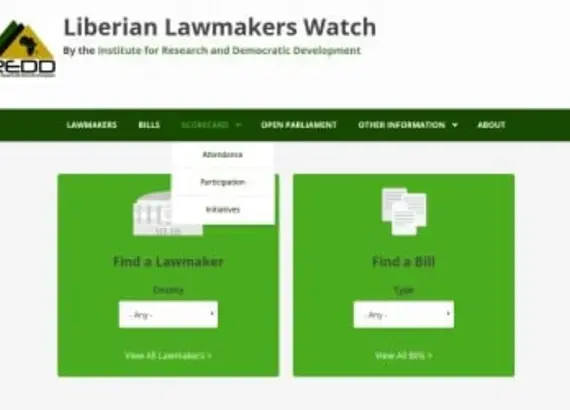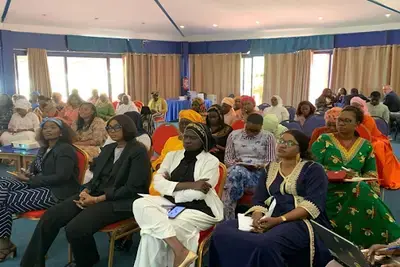
Success Story
Liberian Lawmakers Watch: New Tools Shed Light on Parliamentary Performance before the General Elections
For the average Liberian, finding information on one’s legislator can be a daunting task. With no bill-tracking system or plenary record, citizens are often left in the dark about their lawmakers’ performance. Civil society groups face steep obstacles to advocacy because basic information is hard to come by. This lack of transparency about the bill-making process, committee membership, and hearing schedules make effective legislative engagement in Liberia a significant challenge.
Within this context, the Institute for Research and Democratic Development (IREDD), an NDI partner, is breaking ground with a new tool to help inform Liberians about the performance of their legislators. The Liberian Lawmakers Watch is an interactive website that tracks and publishes statistics on legislators’ plenary attendance, participation in floor debates, committee membership, and bill sponsorship in both the House of Representatives and the Senate. NDI provided support to IREDD to develop the site as part of its “Building Citizen Centered Political Engagement” program funded by the Embassy of Sweden.
At the official launch of the website, held on April 28 at the Royal Grand Hotel in Liberia’s capital, Monrovia, IREDD Executive Director Harold Aidoo expressed hope that the website would promote electoral accountability by enabling voters to make informed choices based on each lawmaker’s platform and performance.
“When we [politicians] are aware of informed voters, we will take our work seriously.”
Echoing Aidoo, Senator J. Milton Teahjay of Sinoe County praised IREDD for providing voters with “a perfect weapon that arms citizens to make wise electoral choices,” noting that “when we [politicians] are aware of informed voters, we will take our work seriously.”
The website launch came on the heels of the release of IREDD’s Legislative Report 2015, a study on the performance of Liberian legislators and of the legislature as a whole. Released on April 18, the report pays particular attention to the structure and capacity of legislative committees and their role in congressional oversight. IREDD identifies several challenges facing the government including weak and ineffective committees, insufficient oversight over the executive branch, and a lack of transparency.
Recommendations to improve legislative effectiveness and accountability include:
- building the research capacity of congressional staff
- improving budget transparency through the production of quarterly finance reports, and
- restructuring the leadership of legislative committees to enhance their productivity.
The report also ranks Senators and Representatives in plenary attendance, floor debate participation, legislative productivity, and oversight activity, thereby providing readers with an informative lawmaker “report card.” The release caused a stir, receiving widespread media coverage and provoking a public debate over the effectiveness of the Liberian legislature and some of its members.
| The website transforms data on legislative attendance and participation into easy to interpret graphs. |
The release of IREDD’s report and website is timely. The Liberian political climate is beginning to heat up in advance of general elections in October 2017, when all 73 members of the House of Representatives will be up for re-election. Because IREDD is making information on legislative performance more accessible, voters will now be more empowered than ever to hold their legislators accountable at the ballot box.
IREDD is one of many parliamentary monitoring organizations (PMOs) working around the world to help build strong, open and accountable parliaments. The recently launched Opening Parliament Initiative provides a forum that connects PMOs to facilitate networking, collaboration and the sharing of best practices.
Published on June 2, 2016



